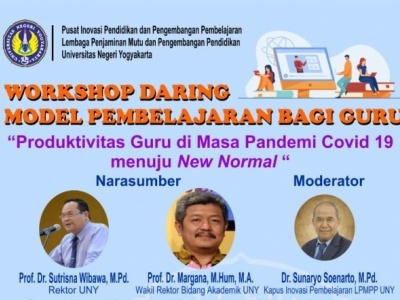ONLINE WORKSHOP ON LEARNING MODEL IN COVID-19 PANDEMIC

At the beginning of March 2020, the terms of Work from Home (WFH) and Study from Home (SFH) have become the main topics in all lines of communication in Indonesia. This is related to the call of the President of the Republic of Indonesia, Joko Widodo to conduct social distancing to limit the covid-19 pandemic spreading. Before Indonesia, in several countries with higher rates of corona virus spread and had already implemented Work from Home (WFH) in the activities of its citizens (including educational activities). The government, companies, educational institutions, and the community have also begun to implement supporting methods and modes (application programs) that can make Work from Home (WFH) and Study from Home (SFH) activities effective while maintaining work productivity and learning.
Now there is an assumption that "working from home" will become a normal work culture for most of us (teachers, and students). In Indonesia, some teachers must carry out learning tasks from home (continuously and as a controlled routine) on an ongoing basis. That is, they have the opportunity to be unproductive working in a totally new environment and without the supervision of the leadership (intently). However, there are a number of ways to get around the problem, especially to prevent teachers from confusion in applying appropriate and effective learning models, as well as continuing professional development, definitely wanting to be productive in utilizing the time in the Covid-19 pandemic. Thus time management must be carried out and controlled properly for improve the quality of professionalism of teachers as professional educators.
On the side of students to "learn from home" has changed learning styles, study habits and management of student tutoring. Initially, the management of tutoring was done face-to-face (synchronous) into the management of tutoring not face-to-face (unsychronous). Certainly the burden and responsibilities of the teaching profession as educators did not necessarily move to parents, brothers or older siblings. Even though the educational background, teaching experience, and other pedagogical aspects are very heterogeneous. In terms of teachers, who are accustomed to and professionals teaching face-to-face, must update themselves to integrate pedagogic abilities with information and communication technology (ICT) skills. This requires a transition process that requires training or workshops on how to apply learning models.
According to the Chairperson of UNY LPMPP Prof. Lantip Diat Prasojo, the purpose of this workshop is to improve the professionalism of teachers in Early Childhood Education (PAUD), primary and secondary education, especially pedagogic competence in applying learning models in the Covid 19 pandemic period. "In addition it is also to increase the availability of digital learning resources about online learning models that are easily accessible to teachers, while increasing excellence, and the creativity of teachers in developing lesson plans in applying learning models in the Pandemic and new normal times, "said Lantip.
Specific targets for online workshop participants in the learning model are PAUD level teachers, basic education and secondary education in the districts of Gunungkidul, Kulonprogo, Bantul, Sleman and the city of Yogyakarta. The broad target of the workshop participants online learning models are all education practitioners in developing learning models. The keynote speaker in this workshop was Prof. Dr. Sutrisna Wibawa, MPd. (Rector of UNY), Prof. Dr. Margana, MHum., M.A. (Vice Chancellor for Academic Affairs UNY) and lecturers at the Yogyakarta State University, who have expertise in learning models. The workshop will be held in stages according to the schedule from 17 June to 2 September 2020.
The system for delivering workshop materials is packaged in several learning resources. Registered workshop participants can follow: resource presentations, and discuss (real-time) through teleconferences, follow the Glacier (Global Access Independence Learning) tutorial learning models through https://glacier.uny.ac.id and for non-registered participants can take part in the Workshop on resource person exposure via youtube UNY Official. (Lantern Diat Prasojo, Tj.Lak)

